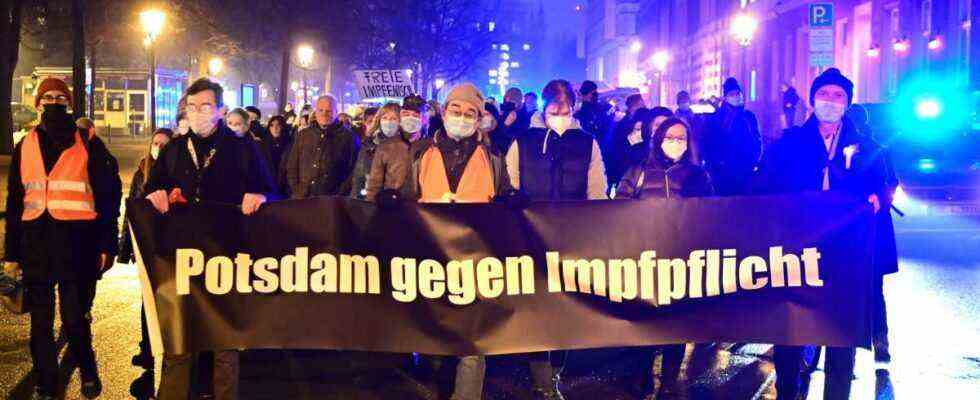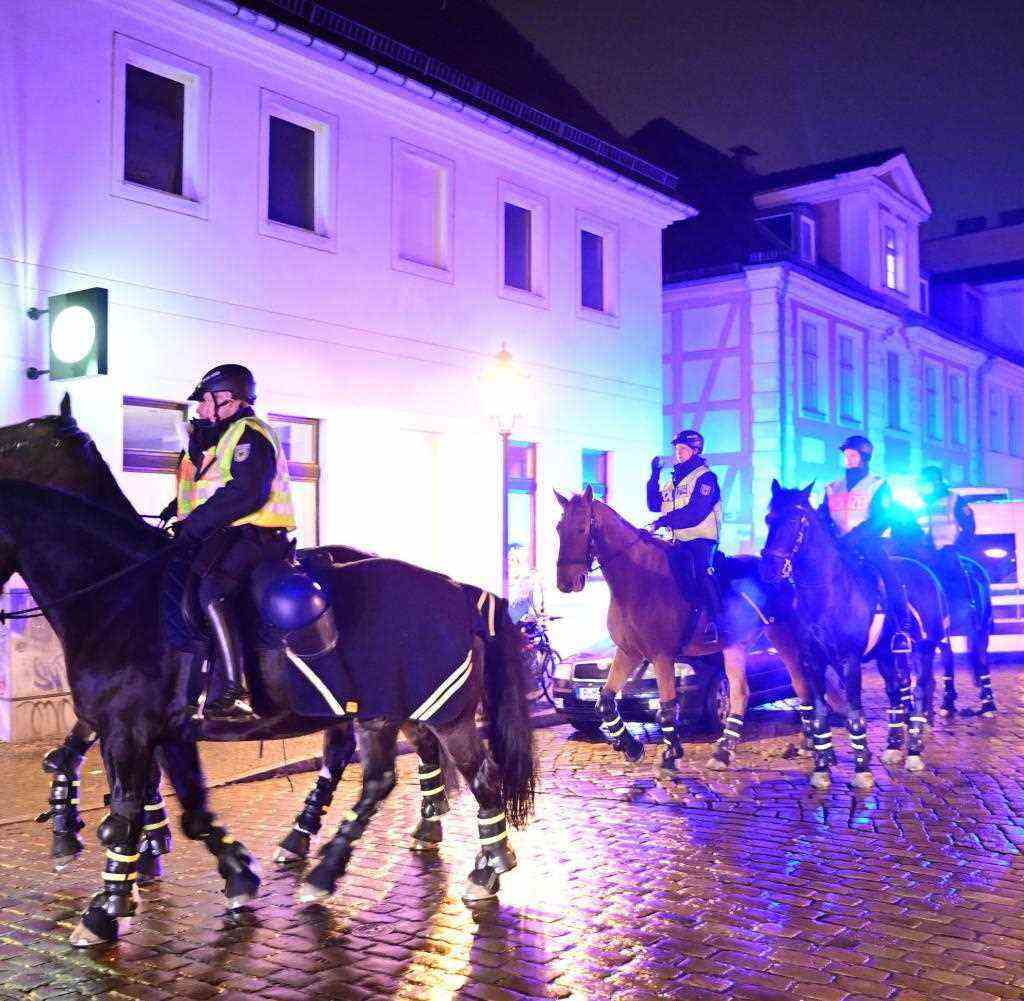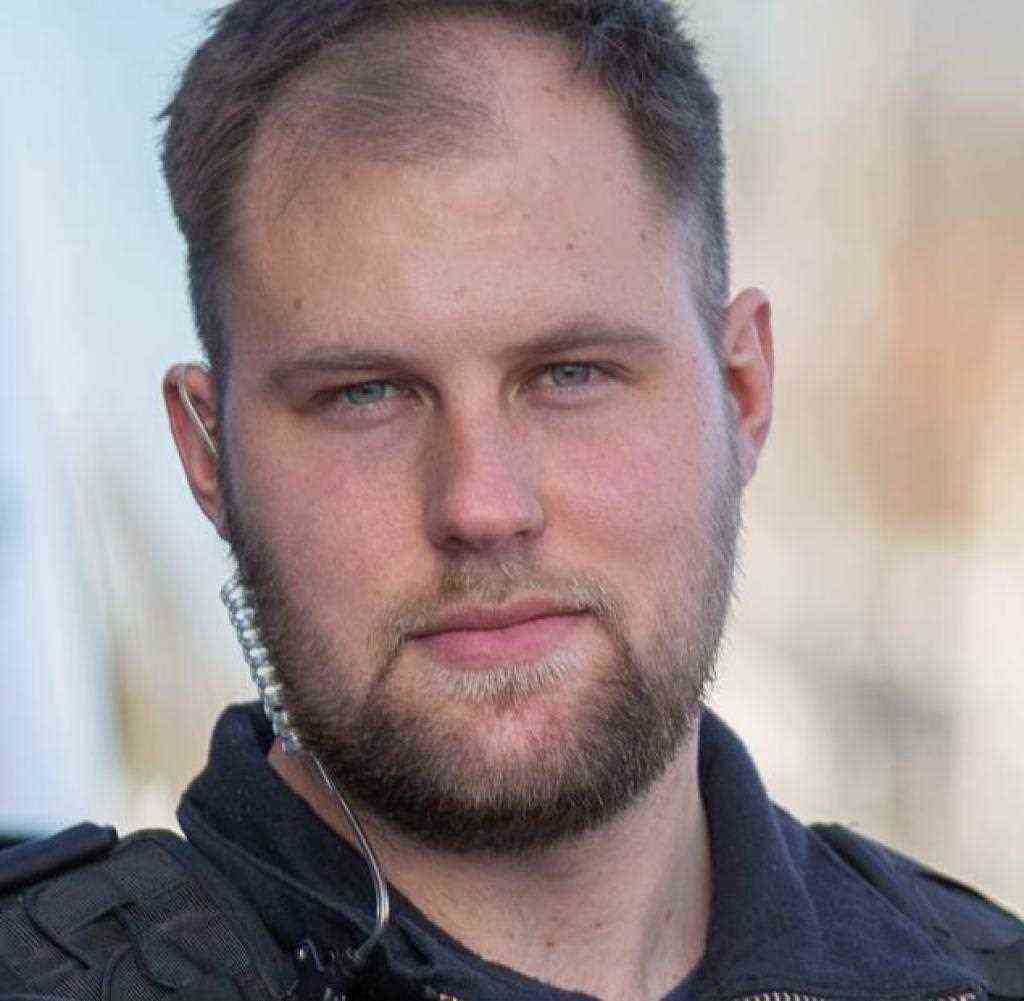17,000 participants in Thuringia – police officers injured in Bautzen
Protesters break police chain
About 100 corona demonstrators break a police chain in Freiberg, Saxony. The officers used batons to push the crowd back.
On Monday evening tens of thousands of people took to the streets in German cities – around 17,000 in Thuringia and 15,000 in Mecklenburg-Western Pomerania. In Cologne and Lübeck, the demonstrators adhered to the mask requirement. In Freiberg they broke a police chain.
A.On Monday evening tens of thousands of people took to the streets in German cities to demonstrate against restrictions in the corona pandemic and a possible vaccination requirement. The police reported large crowds, especially from East Germany. However, there were also counter-protests on Monday, so in Zwickau or with a total of 16 Corona-compliant demonstrations in Leipzig.
In Bautzen at least three police officers were injured. The police said the officers were pelted with paving stones and bottles. A total of around 500 people have moved through the city. Around 150 to 200 of them were violent hooligans and people from the radical right-wing milieu.
In Saxon Freiberg According to initial estimates, around 700 people gathered who repeatedly evaded the police, said a spokesman. When the officers formed a lock with vehicles at one location, there was a breakthrough of about 100 people. A police vehicle was damaged and the perpetrator was taken into custody. The spokesman said that there was an increased potential for violence. Officials were not harmed.
In Thuringia, the police counted more than 17,000 demonstrators across the country by the evening. The largest demonstrations would have been in Gera with around 1,500 participants and Jena took place with over 1,000 participants, said a police spokesman. He described the situation as largely calm and there were no escalations. The spokesman for the Thuringian police said there were also occasional counter-protests “with a small number of participants”.
A demonstration against corona restrictions and mandatory vaccinations runs through the inner city of Rostock
Source: dpa / Bernd Wüstneck
The police in Mecklenburg-Western Pomerania counted a total of more than 15,000 participants in more than 20 locations. In Rostock Some of the several 4,000 demonstrators tried to break through police barriers, whereupon the officers also used pepper spray. In Schwerin were killed by the police around 2400, in Neubrandenburg around 1800 and in Greifswald 650 protesters counted. In Greifswald, opponents tried to stop the protest march with sit-ins.
Police punish regulatory offenses in Potsdam
In Brandenburg, too, the majority of the protest marches were not registered, according to the police. The largest unannounced protest march took place in cottbus with about 3000 people. A police spokesman reported that some people from the right-wing extremist scene were among the participants. In the case of meetings that were not registered, the police recorded criminal charges for violating the Assembly Act and punished administrative offenses for violating Corona requirements.
In Potsdam Hundreds of people came together in the city center despite a ban. “Imagine it’s 3G and nobody goes there,” was among other things to read on posters. The police had previously banned the meeting because of an immediate threat to public safety and order. Replacement meetings in other places should not take place, as a police spokesman emphasized. Afterwards, small groups spread out at different places in the city center. The police were on site with numerous emergency services.
In Potsdam, the police deployed a squadron to stop the protest
Source: dpa / Soeren Stache
In Frankfurt (Oder) Around 1000 people protested against the corona regulations and against compulsory vaccination. When the town hall bell struck at 6 p.m. sharp, a march of protest set off in the direction of the city bridge and on through the neighboring districts. The mood is peaceful, as a reporter from the German Press Agency reported.
In Magdeburg The police broke up an unannounced demonstration of around 1,800 people and, according to their own statements, consistently took action against violations of the general decree of the assembly authority. In Hall According to the police, around 2,400 people took part in four actions. in the Burgenland district Almost 1,800 participants took part in five locations. It was comparatively quiet, said a spokesman.
Protest with masks in Cologne and Lübeck
In Cologne According to the police, the participants of a demonstration gathered on Roncalliplatz next to the cathedral and moved from there through the city center. A police spokesman said that the vast majority of them had to wear a mask on the square. He estimated the number of participants at well over 1000. The registered number of 1500 participants could have been reached.
On the previous Monday evenings there had already been rallies in Cologne, but these were unannounced gatherings. This time two demonstrations had been registered, one of which had the motto “Cologne stands up for freedom 22”. A small group of 20 to 25 participants demonstrated for the corona measures.
In Lübeck Several hundred participants marched peacefully through the city center. On the banners, they demanded, among other things, a free vaccination decision. Others had colored fairy lights wrapped around their bodies. According to the police, the majority of the demonstration participants adhered to the rules of distance and the obligation to wear a mask.
According to the police, there were also protests in other federal states, for example in regensburg, Vilshofen and Bayreuth in Bavaria, in Gummersbach and Fulda in Hessen or in Mainz and Koblenz in Rhineland-Palatinate.



